Census 2022: Transforming Small Area Socio-Economic Indicators through ‘Big Data’ is a project funded by the ESRC Transformative Research 2012/2013.
Investigators: Dr Ben Anderson, Dr Patrick James & Prof. ‘Bakr Bahaj
Contact: b.anderson@southampton.ac.uk
The possible demise of the decennial UK Census presents social, policy and commercial researchers with both a challenge and an opportunity:
- The challenge is to transform ‘census-taking’ by finding robust alternative methods for creating traditional (‘census-like’ indicators) small area socio-economic indicators over time.
- The opportunity is to transform the very nature of the socio-economic indicators themselves (‘census-plus’ indicators) using new analytic methods applied to new geo-coded datasets and to radically accelerate the temporal cycle from decennial to annual or sub-annual production. If we are no longer to be restricted to what can be asked in a Census, then what kinds of social indicators might we want or be able to produce, how regularly and what forms of novel social, policy and commercial analysis might this then underpin?
This project addressed these questions using existing large-scale geo-coded transactional datasets held at the University of Southampton. These included household level energy monitoring data and the project built on recent exploratory work to develop and validate methods for estimating small area ‘Census-like’ and ‘Census-plus’ indicators from telephone call records. The project tested the utility of a range of analytic techniques for deriving traditional and novel small area socio-economic indicators including relatively simple ratios and distribution measures as well as more experimental temporal sequence and profile analysis.

Mean half-hourly electricity consumption per half hour (Tuesday – Thursday) by self-reported employment status of household response person.
Source: Authors’ calculation using Irish CER Smart Meter Trial data October 2009 (n = 3488).
The approach has the potential to radically transform the nature and temporality of small area indicators: Aggregated data from a range of transactional sources might be able to provide replacements for census-like small area tables on at least an annual basis thus providing a resource not only for temporally fine-grained small area social-economic trend observation but also fine grained local intervention impact assessment. In addition the sources may also have the potential to provide totally new but similarly temporally fine-grained small area socio-economic indicators that can provide radically new ways to investigate local and regional socio-economic trends. Potential examples include the estimation of social-interaction based indicators from social communication traces and social-sustainability indicators from energy consumption/production measurements.
The #Census2022 project attracted attention from academic, commercial and governmental sectors and built an active project advisory/stakeholder group to give steer to the work and act as results champions.
Recent updates
New Census2022 paper published in the Computers, Environment and Urban Systems 07-2016 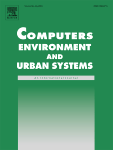
“Electricity consumption and household characteristics: Implications for census-taking in a smart metered future” briefly reviews the nature of current and future census taking in the UK before outlining the household characteristics that are to be found in the UK census and which are also known to influence electricity load profiles. The paper then uses the Irish CER ...
Census2022 research features at MRS seminar on the future of the UK census 03-2016 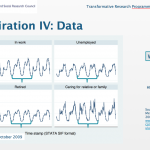
SERG’s Dr Ben Anderson recently gave a summary of the ESRC funded Census2022 project results as part of a Market Research Society symposium on “Can Big Data replace the Census? What does Big Data give us now?“. Speaking alongside representatives from CACI, Telefonica and the Office for National Statistics, Ben outlined the potential value of electricity smart ...
SERG research features at Royal Statistical Society Conference 09-2015 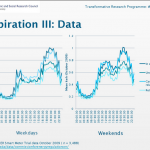
SERG’s Dr Ben Anderson gave two papers at the recent Royal Statistical Society International Conference 2015 held at the Univesity of Exeter: “What can DECC’s NEED data tell us about levels and change in domestic electricity consumption?” gave an overview of some recent analysis of DECC’s domestic energy consumption dataset drawing implications for the need to ...
#Census2022 paper on smart meter data for a smart census published 07-2015 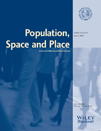
Newing, Andy, Anderson, Ben, Bahaj, A.S. and James, P.A.B. (2015) The role of digital trace data in supporting the collection of population statistics – the case for smart metered electricity consumption data. Population Space and Place, 1-13. (doi:10.1002/psp.1972). Debates over the future of the UK’s traditional decadal census have led ...
ONS publishes SERG report on smart meter data for a future census 07-2015 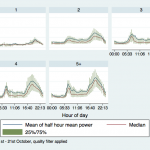
The ongoing evolution of the decennial UK Census presents social, policy and commercial researchers with both a challenge and an opportunity. The challenge is to transform ‘census-taking’ by finding robust alternative methods for creating small area socio-economic indicators over time. The opportunity is to transform the very nature of the socio-economic indicators themselves using new ...
Census2022 project: Four conference papers presented 09-2014
The Census2022 project recently gave a series of presentations of preliminary results at the following conferences and events: British Society for Population Studies Annual Conference: University of Winchester, 8-10 September 2014, (slides) Behave 2014 ‘Paradigm Shift: From Energy Efficiency to Energy Reduction through Social Change’, the third European conference on behaviour and energy efficiency, Saïd Business School ...
"The role of commercial data in #Census2022" session @ RGS/IBG 2014 01-2014
The following session has been accepted for the RGS Annual Conference 2014 Session Title: The role of commercial data in #Census2022 Organisers: Dr Ben Anderson and Dr Andy Newing, Sustainable Energy Research Group, University of Southampton Session Chair: Keith Dugmore, Demographic Decisions Ltd. and Demographics User Group Session Sponsor: ESRC #Census2022 Transformative Research Project Abstract: Consumer data collected by commercial ...
Census 2022 project grabs attention at MRS meeting 11-2013 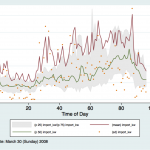
The new ESRC funded Census 2022 project has attracted attention from the Market Research Society’s Census and Geodemographic Group (CGG). Andy Newing gave an overview of the project’s aims and objectives as well as some preliminary data analysis at a meeting hosted by GFK NOP, 19th November 2013 at Ludgate House, London. Several members of ...
Census 2022: Transforming Small Area Socio-Economic Indicators through ‘Big Data’ 06-2013 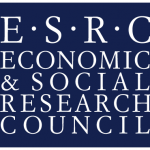
Census 2022: Transforming Small Area Socio-Economic Indicators through ‘Big Data’ is a project funded by the ESRC Transformative Research 2012/2013. Investigators: Dr Ben Anderson, Dr Patrick James & Prof. ‘Bakr Bahaj Contact: b.anderson@southampton.ac.uk The possible demise of the decennial UK Census presents social, policy and commercial researchers with both a challenge and an opportunity: The challenge is to transform ‘census-taking’ ...
